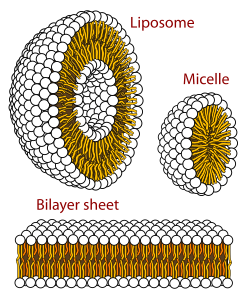Fat is a nutrient source that accounts for 60% of the total energy required at rest and during exercise large amounts, when the excessive consumption of the body will store fat, as well as when there is excess carbohydrates and protein will be converted into stored body fat (but the incidence of This can not be otherwise, fats into carbohydrates and proteins).
Fat in the diet (dietary fat) has the function as:
 |
| Contained fat tissue in the body |
- Sources of energy reserves stored in the body;
- Media transformation of some fat-soluble vitamins (Vitamins A, D, E and K)
- Giving a sense of satiety and slows gastric emptying mechanism, satiety last a long time;
- Help manufacture hormones, forming part of the brain and nervous system, form cell membranes for every cell in the body;
- Helps regulate body temperature;
- Provide two essential fatty acids (linoleic acid and linolenic acid) that can not be made by the human body.
In the human body, fats are divided into two groups:
- Structural fat: part of the cell wall
- Functional fat: a steroid hormone, prostaglandin and fatty deposits that can be used as an energy reserve
Fats are compounds composed of fatty acids and glycerol, both of these elements combine to form a certain sequence to form fat, fat ties are based on:
- Saturated Fat , potentially increasing blood cholesterol, especially LDL (low density lipoprotein), the fat tends to solidify at room temperature, is found in red meat, cheese, butter, coconut oil and palm oil;
- Cholesterol, a type of fat that is related strongly with the risk of some diseases, especially blood vessels and the heart, the source of these fatty foods are lobster, shrimp, liver, eggs, meat and dairy products;
- Trans Fatty Acids, derived from unsaturated fats undergo compaction process with partial hydrogenation technique that causes changes in the chemical bonding configuration, making the character not unlike the saturated fats, found in snack foods, fried foods, margarine and vegetable miyak certain
- Polyunsaturated fats, these fats help lower total blood cholesterol, especially LDL, found in fish, safflower oil (Carthamus tinctorius) and sun flower oil.
- monounsaturated fat, helping to reduce the presence of cholesterol in the blood levels of HDL (hight density lipoproteins) and LDL will ride down, either consumed for health, type of food is olive oil, peanut oil canola oil, fish, poultry and avocado.

Fat has many functions in the body, but the need to control the consumption of a healthy diet, while for the reduction of fat deposits in the body the necessary understanding
how to burn fat and build muscle in the body, especially the formation of the abdominal muscles is necessary to understand that:
- Eliminate the consumption of simple carbohydrates with complex carbohydrates such as sweet potatoes and brown rice;
- Getting enough protein, because the protein plays a role in the formation of muscle tissue and lose fat, 1 g protein required for every pound of body weight;
- Drink 16 oz of cold water upon waking up, the cold water will stimulate the metabolism to heat the body temperature at the time of waking;
- Doing regular exercises that focus on areas of muscle formation in the right way;
- Getting enough rest for recovery of the body.
References:
id.wikipedia.org/wiki/Lemak
No comments:
Post a Comment